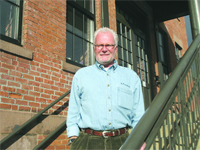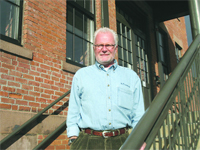
Its a Small World
Springfield’s ICT Center Forges Connections in a High-tech Global Marketplace

Gordon Snyder says teaching the teachers is key to keeping young Americans competitive in the high-tech world.
Gordon Snyder has done a lot of blogging about some fairly complex technologies, but nowadays, he likes to communicate through Twitter at least as much.
I find its much more effective if I have to condense something online to 140 characters or less, he laughed.
Whatever the vehicle, social media like Twitter are among the latest in a series of communications advances connecting people around the world like never before. And Snyder, executive director of the Information and Communications Technologies (ICT) Center in Springfield, is all about making connections.
Specifically, the ICT Center a division of Springfield Technical Community College located in the STCC technology park forges partnerships with other schools, mainly community colleges, to encourage the teaching of the most up-to-date information in tech-related courses, in order to help maintain American competitiveness in the global marketplace.
That is essentially what the center was created to do when it was launched in 1997, and the way communications, Internet use, and other technology has dramatically changed in the past 12 years in many ways reinforces the need for such a resource.
After all, hardly anyone was blogging in the late 1990s, and tweeting was the domain of birds.
Using far more than 140 characters, Snyder recently spoke with BusinessWest about how the ICT Center has succeeded in helping teachers, students, and others stay atop the fast-moving world of computer and communications technology.
Foundation for Success
At its core, ICT helps to develop programs and curriculum, Snyder said. We do a lot of faculty training, a lot of work with new and emerging technology, we offer workshops and conferences, and we provide subject-matter expertise.
And in that latter regard, the center has certainly grown. In the early days, it was focused on three subjects: fiber optics, wireless communications, and networking. But today, ICT calls upon some 60 experts in a much broader range of subjects to speak at conferences and work with colleges and employers.
We have faculty doing presentations on their work, giving presentations on things that people can take back to their own classrooms, he explained.
The mission of the ICT Center is based on an assertion that the information and communications technology industry driven by a demand for instantly accessible information is profoundly changing the world, as partly evidenced by the modes of communications that have existed for only a short time.
Preparing a workforce to compete in this global communications marketplace is todays major challenge for the ICT industry, and with even more rapid breakthroughs anticipated, education is the key.
In response to that rapidly growing need, STCC established the Northeast Center for Telecommunications Technologies in 1997. Aided by outside funding from the National Science Foundation and a number of businesses, the center was conceived as a resource for educators to help them stay abreast of the most current trends and technologies in their telecommunications programs, in turn preparing the experts of tomorrow.
Were a division of the college. Were making sure the programs are up to date, Snyder said. Another large part of our effort is recruiting and retaining underrepresented populations into the ICT fields.
To that end, the center works closely with organizations such as the Institute for Women in Technology and Trades (IWITT). Their focus is to attract women into some of these underrepresented programs, like computer science programs, he explained. Very few women are graduating from these programs across the U.S., so how do we get women interested in these programs and then keep them from dropping out or changing their major?
It wasnt too long before the NCTT got its first name change, however.
We wanted to expand our footprint beyond the Northeast, Snyder said, so we took the name of the National Center for Telecommunications Technologies.
The center was working with community colleges, and some four-year schools, in the Northeast, he continued. In changing its name to announce a broader focus, we began to reach out to the rest of the country, creating more partnerships and relationships with community colleges. It has been pretty successful.
So much, in fact, that two regional versions of the NCCT have been established in Fort Worth, Texas and San Francisco.
The center underwent another transition in the early 2000s that led to another name change just last year.
Back then, the Internet bubble was bursting, and the infrastructure was in some ways built out in the U.S, as much as it would be for awhile. We started to see a change in industry needs, and we started to add IT stuff to our physical layer content, Snyder said. It was a natural migration over the years, so a year and a half ago, we became the Information and Communications Technologies Center, a better description of the work were doing here.
Connecting the Dots
The ICT Center receives much less outside funding than it used to, but Snyder said it has developed a self-sustaining model that accomplishes a wider range of goals.
A lot of what were doing is making connections, he said. We were funded more in the beginning than were getting now, but I think were doing more now with a lot less money because were finding these people and making connections.
For instance, the center works on programs with the Economic Development Council of Western Mass. and the Regional Employment Board, hosting area business people at STCC for technology and communications conferences, which in turn raises the profile of the college.
That gives exposure to the campus, and it builds credibility for our students and our graduates, Snyder said. If theyre impressed with the place, theyre going to look more closely at our students when it comes time to hire somebody.
And community colleges, he said, are playing a key role in preparing students for high-tech careers, no matter what kind of credentials they have when they arrive.
You may not come in prepared; you might not come in at the right math level to take some of these courses, he said. If you took a good track that included math and science, youll place, and will be able to jump into the programs right away. Computer skills are important. But a lot of students have some catching up to do but thats one of the great things about community colleges.
Students who choose to study in the ICT fields might wind up working within that industry, but they can also apply those skills to an ever-widening number of other careers, said Nina Laurie, associate director of the ICT Center.
Technology is a big part of other disciplines, like finance and biotech, she said. So if someone wants to focus on one area and apply it to another area, thats really great, too.
But it all starts with training the trainers, and the center continues to grow its offerings in order to keep educators up to date, whether or not they can attend educator conferences like one being held in San Francisco on Jan. 7 and 8.
Sometimes its hard to get people caught up, Snyder said. With the reduced funding, were looking at other ways to help people. We have a YouTube channel, and were looking at streaming some conferences for people who cant attend them live. Budgets are tight right now, and were looking at other ways to disseminate the work were doing.
The ICT Centers Online Impact conferences which focus on social-media applications like Facebook, Twitter, and LinkedIn, are another good example of training people in the use of a business tool that didnt exist a decade ago. The second annual Online Impact event is scheduled for Jan. 14 at STCC (see related story, page 13).
Such conferences are just another way of making those connections Snyder talked about.
Its not always the same people who participate, but there are always new people coming into the mix, and that always changes things, he said.
An important thought and, at just under 140 characters, one he can instantly share with the world.
Joseph Bednar can be reached at




